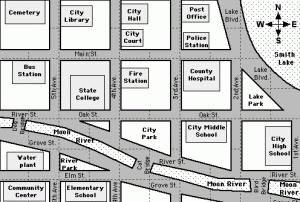Posted by Teresa on December 28, 2009 under General, Housing Trends, Landlord Tips, Marketing for Landlords | 
 Higher rental inventories and overbuilding, plus foreclosed homes and job losses combined to create one tough rental market in 2009—and it’s predicted to continue through 2010.
Higher rental inventories and overbuilding, plus foreclosed homes and job losses combined to create one tough rental market in 2009—and it’s predicted to continue through 2010.
So what will make your rental property stand out from the rest? With tenants in the driver’s seat, asking for lower rents and other amenities, what can landlords and property managers offer them? What do quality tenants want?
Price, price, price: Tenants want to be sure the rent is in line with the going market rate.
Location, location, location: Parents want to be close to their child’s school. Most everyone prefers to be close to their work. Students like to be close to campus and to nightlife. Families want to be close to parks, grocery stores, downtown, the library—you get the picture. Convenience is a big factor.
Cleanliness: A spotless rental unit will appeal to everyone.
Fitness facilities: Apartment complexes with a bright, clean fitness room with newer equipment that works properly will score higher with most tenants.
Garages: A garage with an automatic door opener is a big draw to most mid-to-upper income tenants.
Appliances: Dishwashers are almost a must. Everybody loves washer/dryer hookups. And if your rental has the washer and dryer as well, it will be scored higher than one without.
Closets and storage: People need space to store their stuff. Lots of closets inside, plus decent outdoor storage for their toys are most appreciated by higher-income tenants.
Accessibility: For older renters and those with physical limitations, easy access to the property shows that you care (and for certain properties, is mandated by law).
Think about the type of tenant you want to attract, and add the improvements that will attract them. If your rental unit already has everything your target tenant wants, make sure your advertising says so!
We recommend you also automatically screen all tenants as part of your application process. For more landlord resources, including forms and information on tenant screening, turn to E-Renter.com. .
Posted by Teresa on December 23, 2009 under Landlord Tips | 
 As we close the books on 2009, here are some tips to keep your rental properties in good condition and your tenants safe:
As we close the books on 2009, here are some tips to keep your rental properties in good condition and your tenants safe:
While it’s not cold everywhere in the winter, frozen pipes are not unknown to even Florida landlords. So if you know freezing temperatures are in store, check your pipes! Call your tenants and remind them to leave a little water dripping and the under sink cabinet doors open.
If your tenants celebrate the holidays with indoor trees and exterior lights, it’s a good idea to stop by and check that overloaded circuits are not a concern. Too many house and apartment fires are started by Christmas trees. Your rental agreement should clearly state what holiday lighting is allowed—but a personal inspection is also a very good idea.
Make sure your tenants are not using space heaters improperly—if at all. Portable and fixed space heaters are associated with nearly 22,000 residential fires each year in the U.S., with approximately 300 deaths. They should not be used to warm beds, dry clothing, thaw pipes, or cook food. They can be dangerous, and should be avoided. If heating systems function properly in your rental units, there should be no need for space heaters.
If you allow smoking in your rentals, this is a good time to remind tenants of proper disposal of smoking materials. No smoking in bed; no placing cigarettes on counters or windowsills. Encourage tenants to extinguish cigarettes under running tap water.
Check your insurance coverage for water damage and fire. In fact, the end of the year is a good time to schedule time with your insurance broker or sales representative to review all of your coverage. You do not want to find out you’re underinsured after something catastrophic happens.
Keep your peace of mind by keeping your rental property and your tenants safe into the new year!
Posted by Teresa on December 21, 2009 under Housing Trends, Landlord Tips | 
Some real estate investors are always looking for the next hot market for rentals. Others prefer to keep their purchases of investment property close to home—so they can better manage their properties. Still others are sitting this market out—waiting for home values and rents to stabilize before even thinking about buying additional properties.
Here are a few ideas to consider if you’re going to be searching for investment properties.
Values exist in almost every city or town. Look for older, yet safe neighborhoods that are obviously kept up by owners. Lower home prices often mean better cash flow.
Keep your eyes and ears open for activity. Is your city is planning a rezone of a particular area? Is a previously designated commercial district going residential? Or is an improvement project planned for a particular area? Knowing what’s going to happen can make a big difference In whether an area is poised for rental property growth or decline.
Areas that have been devastated by overbuilding and plummeting employment are ripe for the picking. Bargains will abound in depressed housing markets like Las Vegas and larger cities in California.
If you’re considering buying away from where you live, add in the cost of a property management company to your calculations.
Go where the jobs are. The idea is to pay attention to announcements of large-scale hiring, plant openings, or relocations. Examples are the new Boeing plant to be built near Charleston, SC, or the purchase of the prison in Thomson, Illinois by the federal government. You can even set up a Google alert to tell you when any mass hiring article hits the internet! When the picture starts improving, notice what states have the highest jumps in employment rates.
Go where the students are. We’ve covered the pros and cons of renting to students before. But the rental markets in college towns tend to be more stable—students will always need a place to live, which is a big plus!
 Some real estate investors are always looking for the next hot market for rentals. Others prefer to keep their purchases of investment property close to home—so they can better manage their properties. Still others are sitting this market out—waiting for home values and rents to stabilize before even thinking about buying additional properties.
Some real estate investors are always looking for the next hot market for rentals. Others prefer to keep their purchases of investment property close to home—so they can better manage their properties. Still others are sitting this market out—waiting for home values and rents to stabilize before even thinking about buying additional properties.
Here are a few ideas to consider if you’re going to be searching for investment properties.
- Values exist in almost every city or town. Look for older, yet safe neighborhoods that are obviously kept up by owners. Lower home prices often mean better cash flow
- Keep your eyes and ears open for activity. Is your city is planning a rezone of a particular area? Is a previously designated commercial district going residential? Or is an improvement project planned for a particular area? Knowing what’s going to happen can make a big difference In whether an area is poised for rental property growth or decline
- Areas that have been devastated by overbuilding and plummeting employment are ripe for the picking. Bargains will abound in depressed housing markets like Las Vegas and larger cities in California.
- If you’re considering buying away from where you live, add in the cost of a property management company to your calculations.
- Go where the jobs are. The idea is to pay attention to announcements of large-scale hiring, plant openings, or relocations. Examples are the new Boeing plant to be built near Charleston, SC, or the purchase of the prison in Thomson, Illinois by the federal government. You can even set up a Google alert to tell you when any mass hiring article hits the internet! When the picture starts improving, notice what states have the highest jumps in employment rates.
- Go where the students are. We’ve covered the pros and cons of renting to students before. But the rental markets in college towns tend to be more stable—students will always need a place to live, which is a big plus!
We recommend you also automatically screen all tenants as part of your application process. For more landlord resources, including forms and information on tenant screening, turn to E-Renter.com. .
 Higher rental inventories and overbuilding, plus foreclosed homes and job losses combined to create one tough rental market in 2009—and it’s predicted to continue through 2010.
Higher rental inventories and overbuilding, plus foreclosed homes and job losses combined to create one tough rental market in 2009—and it’s predicted to continue through 2010.
